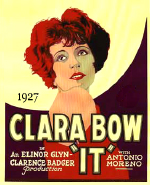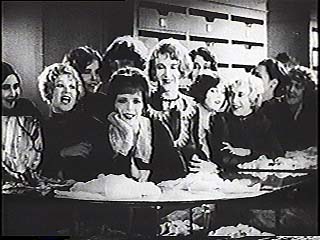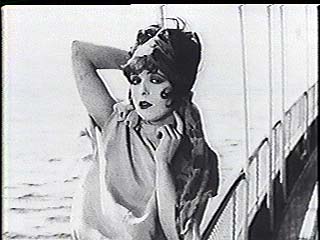

"It" is that quality possessed by some which draws all others with its magnetic force. With "It" you win all men if you are a woman and all women if you are a man. "It" can be a quality of the mind as well as physical attraction." Elinor Glyn
Elinor Glyn made her mark in the first 25
years of the century with racy novels for the time, and her fascination
with  Hollywood brought her in contact
with stars and producers that increased her fame. She is probably
remembered most for coining the term "It" which was
supposed to describe some mystical, intangible quality possessed
by a male or female that made him or her irresistible to the opposite
sex. The whole idea is a lot of hokum, but it brought her phenomenal
popularity in the twenties and the offer to have a whole feature
length movie based on that concept.
Hollywood brought her in contact
with stars and producers that increased her fame. She is probably
remembered most for coining the term "It" which was
supposed to describe some mystical, intangible quality possessed
by a male or female that made him or her irresistible to the opposite
sex. The whole idea is a lot of hokum, but it brought her phenomenal
popularity in the twenties and the offer to have a whole feature
length movie based on that concept.
Of course, who better to star in this movie than the effervescent Clara Bow who was at the height of her fame in 1927. Although "It" is neither a great movie nor a bad movie, anything with Clara Bow is made twice as good as it could be simply because of her presence.
The movie premise is simple and not very original (the plot is amazingly similar to Mary Pickford's "My Best Girl"). A poor shopgirl is in love with the rich son of the owner of the department store in which she works, and she eventually get him, too. But this was the "stuff" that defines the twenties unbridled optimism, a go-getter who gets what he or she wants (this is Harold Lloyd's film persona and why he was so popular in the twenties but less successful in the thirties).
There's a good example of this when Betty
Lou comes home after Monty has agreed to take her to the Ritz.
She has no evening dress to wear, so she and Molly set about cutting
up the work dress she has on and transforming it into some elegant
attire that is appropriate for the occasion. Within a couple of
hours, she has a "new" dress and is ready to go out
for the evening. Only in the movies!
Elinor Glyn wrote the story, and, we all know she isn't known for her great literary contributions, and, of course, "It" is no exception. There's so much about it that's predictable. For example. When Cyrus finally asks Betty Lou out, she doesn't ask to return to the Ritz or go to the local country club dance. She gets him on her terrritory, an experience his upper-class lifestyle has never provided him. They go to Coney Island. And, predictably, he has the time of his life and falls very much in love with her.
The movie also uses the more innocent morality of the twenties (movie morality, that is) prominantly in the story. Although Cyrus is in love with Molly, the fact that she has had a baby out of wedlock (or so he thinks), means he can never marry her. But he's not above having a secret affair with her. This is the one flaw in the story. Although Betty Lou is exonerated of having the baby out of wedlock, we still have a problem with the kind of fellow Waltham is by suggesting such an arrangement. We would like to see our hero and heroine without any flaws.
Next to Bow, the finest performance in the film is the character of Monty by William Austin. This little-known actor is perfect for the silly, somewhat dim-witted bon vivant. Many times the comic relief in a movie is just thrown in for that purpose with no real part in the story. No so here. Monty is very crucial to the storyline and offers some fine comic moments. One of these is at the hands (or mouth, actually) or Betty Lou. When the authorities come to take the baby and see Monty standing in the doorway, they ask if he's the father of the child. Betty Lou snaps back, "Him? He couldn't give birth to a suspicion!"
Let's not forget that the film was directed by Clarence Badger, and with the presence of such luminaries as Clara Bow and Antonio Moreno, even a mediocre story like this just couldn't' be bad.
copyright 200 by Tim Lussier, all rights reserved